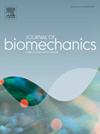在未成熟牛软骨的应力松弛过程中,滑液不会延缓液体渗出
IF 2.4
3区 医学
Q3 BIOPHYSICS
引用次数: 0
摘要
间质流体负载支撑(FLS)是软骨润滑的主要机制,可产生低摩擦系数,同时增强组织的承载能力。滑液(SF)因其粘度,可通过减缓软骨间质的渗出来延缓FLS的损失。本研究通过比较浸泡在磷酸盐缓冲盐水(PBS)或健康成熟的牛滑液中的未成熟牛关节软骨在无约束压缩(液体渗出横切侧组织边界)和压痕测试(液体渗出关节表面)下的应力-松弛(SRL)反应来验证这一假设。为了研究 SF 分子成分扩散到软骨中的影响,还研究了 SF 中培养时间对 SRL 的影响。直接比较在 PBS 和 SF 中的 SRL 反应,在无约束压缩中的 SRL 反应没有明显差异(p = 0.98),斜率为 m = 1.00 ± 0.04(R2 = 0.989 ± 0.007)。在 PBS 中测试的样品表现出特有的弛豫时间,τPBS=42.6 ± 5.3 秒,τSF=40.8 ± 4.7 秒,两者差异不大(p = 0.40)。在 SF 中孵育 24 小时后,SRL 反应无显著差异(p = 0.39,m=1.03 ± 0.12;R2=0.983 ± 0.011,τPBS = 43.4 ± 10.7 秒与τSF = 41.5 ± 4.8 秒相比,p = 0.59)。压痕测试表明,PBS 与 SF 的 SRL 反应在统计学上存在显著差异,但在功能上并不显著,斜率为 m = 0.958 ± 0.060(R2 = 0.957 ± 0.020,p = 0.029;τPBS = 16.9 ± 2.6 s,τSF = 19.4 ± 3.3 s,p = 0.073)。基于这些结果,我们否定了健康 SF 因其粘度而能延缓软骨中 FLS 损失的假设。本文章由计算机程序翻译,如有差异,请以英文原文为准。
Synovial fluid does not retard fluid exudation during stress-relaxation of immature bovine cartilage
Interstitial fluid load support (FLS) is a dominant mechanism of lubrication in cartilage, producing a low friction coefficient while enhancing the tissue’s load bearing capabilities. Due to its viscosity, synovial fluid (SF) may retard loss of FLS by slowing the exudation of interstitial fluid from the cartilage. This study tested this hypothesis by comparing the stress-relaxation (SRL) response of immature bovine articular cartilage immersed either in phosphate buffered saline (PBS) or in healthy mature bovine SF, under unconfined compression (fluid exudation across cut lateral tissue boundary) and indentation testing (fluid exudation across articular surface). To investigate the influence of diffusion of SF molecular constituents into cartilage, the effect of incubation time in SF on SRL was also investigated. The SRL response in unconfined compression was not significantly different in PBS versus SF when compared directly (p = 0.98) and had a slope of = 1.00 ± 0.04 ( = 0.989 ± 0.007). Samples tested in PBS exhibited characteristic relaxation times, =42.6 ± 5.3 s and = 40.8 ± 4.7 s, that were not significantly different (p = 0.40). Incubation time of 24 h in SF resulted in no significant difference in the SRL response (p = 0.39, =1.03 ± 0.12; =0.983 ± 0.011, and = 43.4 ± 10.7 s versus = 41.5 ± 4.8 s, p = 0.59). Indentation testing showed some statistically significant, but functionally insignificant, difference in SRL responses in PBS versus SF with a slope of = 0.958 ± 0.060 ( = 0.957 ± 0.020, p = 0.029, and = 16.9 ± 2.6 s versus = 19.4 ± 3.3 s, p = 0.073). Based on these results, we reject the hypothesis that healthy SF can retard the loss of FLS in cartilage due to its viscosity.
求助全文
通过发布文献求助,成功后即可免费获取论文全文。
去求助
来源期刊

Journal of biomechanics
生物-工程:生物医学
CiteScore
5.10
自引率
4.20%
发文量
345
审稿时长
1 months
期刊介绍:
The Journal of Biomechanics publishes reports of original and substantial findings using the principles of mechanics to explore biological problems. Analytical, as well as experimental papers may be submitted, and the journal accepts original articles, surveys and perspective articles (usually by Editorial invitation only), book reviews and letters to the Editor. The criteria for acceptance of manuscripts include excellence, novelty, significance, clarity, conciseness and interest to the readership.
Papers published in the journal may cover a wide range of topics in biomechanics, including, but not limited to:
-Fundamental Topics - Biomechanics of the musculoskeletal, cardiovascular, and respiratory systems, mechanics of hard and soft tissues, biofluid mechanics, mechanics of prostheses and implant-tissue interfaces, mechanics of cells.
-Cardiovascular and Respiratory Biomechanics - Mechanics of blood-flow, air-flow, mechanics of the soft tissues, flow-tissue or flow-prosthesis interactions.
-Cell Biomechanics - Biomechanic analyses of cells, membranes and sub-cellular structures; the relationship of the mechanical environment to cell and tissue response.
-Dental Biomechanics - Design and analysis of dental tissues and prostheses, mechanics of chewing.
-Functional Tissue Engineering - The role of biomechanical factors in engineered tissue replacements and regenerative medicine.
-Injury Biomechanics - Mechanics of impact and trauma, dynamics of man-machine interaction.
-Molecular Biomechanics - Mechanical analyses of biomolecules.
-Orthopedic Biomechanics - Mechanics of fracture and fracture fixation, mechanics of implants and implant fixation, mechanics of bones and joints, wear of natural and artificial joints.
-Rehabilitation Biomechanics - Analyses of gait, mechanics of prosthetics and orthotics.
-Sports Biomechanics - Mechanical analyses of sports performance.
 求助内容:
求助内容: 应助结果提醒方式:
应助结果提醒方式:


